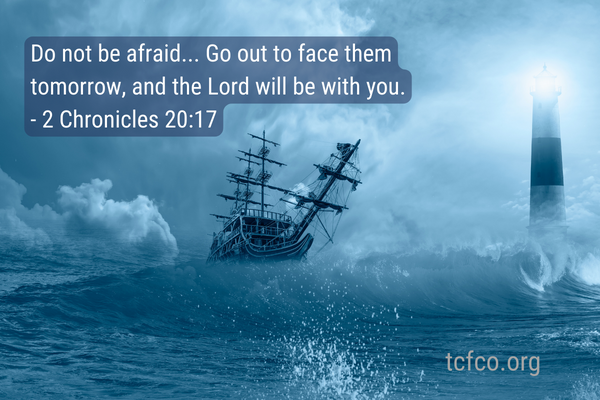1. For or Against?
Difficulties are inevitable in life (in this fallen world). They bring out the best or the worst in us. Difficulties force us to be aligned with the purposes of the Kingdom of God (to be in the house of God, salvation), Or to turn counter purposes to the Kingdom of God (sin/evil).
God did not promise that life will be easy (that would be inconsistent with the existence of sin/evil in the world), be He did promise His presence, grace, wisdom, and guidance in handling difficult situations the right way.
2. Right Resolve Leads to Right Prayer
In 2 Chronicles 20, we see the story of King Jehoshaphat. He was surrounded by multiple enemies on all sides at once. 2 Chronicles 20:3-4 says that King Jehoshaphat “resolved to inquire of the Lord, and he proclaimed a fast for all Judah. The people of Judah came together to seek help from the Lord”.
2 Chronicles 20 makes a great reading of how king Jehoshaphat handled the situation and how God guided/helped.
3. Battles Teach Right Priorities
God allows battles/difficulties and He has a glorious purpose for them – not the least of which is to prepare/shape/train us for His Kingdom purposes and to get our priorities right. Judges 3:1-2 says God left enemies surrounding Israelites “to test all those Israelites who had not experienced any of the wars… to teach warfare to the descendants of the Israelites who had not had previous battle experience”.
Every generation of God’s people is going to have their battles against evil and against the enemies of God. It is about being on the right side of the battle (God’s side). Prayer is not so much about getting the results we want (in our fallen state), but about relationship with God, for His results and purposes – which is also the results that we should want, as ultimately we want to be His children in His Kingdom.
4. Jehoshaphat’s Prayer and God’s Response
4.1. Jehoshaphat’s Prayer
2 Chronicles 20:6-12: Jehoshaphat stood up in the assembly of Judah and Jerusalem at the temple of the Lord in the front of the new courtyard and said:
“Lord, the God of our ancestors, are you not the God who is in heaven? You rule over all the kingdoms of the nations. Power and might are in your hand, and no one can withstand you. Our God, did you not drive out the inhabitants of this land before your people Israel and give it forever to the descendants of Abraham your friend? They have lived in it and have built in it a sanctuary for your Name, saying, ‘*If calamity comes upon us, whether the sword of judgment, or plague or famine, we will stand in your presence* before this temple that bears your Name and will cry out to you in our distress, and you will hear us and save us.’
“But now here are men from Ammon, Moab and Mount Seir, whose territory you would not allow Israel to invade when they came from Egypt; so they turned away from them and did not destroy them. *See how they are repaying us* by coming to drive us out of the possession you gave us as an inheritance. Our God, *will you not judge them?* For we have no power to face this vast army that is attacking us. We do not know what to do, but our eyes are on you.” – 2 Chronicles 20:6-12
4.2. God’s Response
2 Chronicles 20:13,15-17: “All the men of Judah, with their wives and children and little ones, stood there before the Lord… This is what the Lord says to you:
“Do not be afraid or discouraged because of this vast army. For the battle is not yours, but God’s. Tomorrow march down against them… You will not have to fight this battle. Take up your positions; stand firm and see the deliverance the Lord will give you, Judah and Jerusalem. Do not be afraid; do not be discouraged. Go out to face them tomorrow, and the Lord will be with you.’” – 2 Chronicles 20:13,15-17

